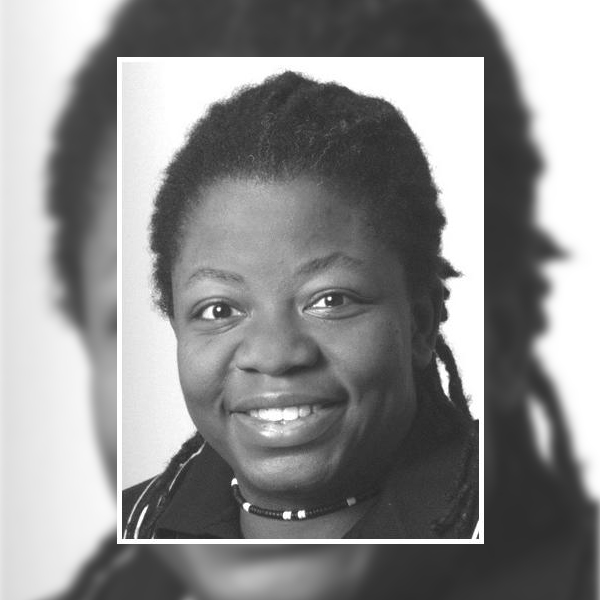
Meet alumna Samantha Blackmon
Dr. Samantha Blackmon, associate professor, Department of English, Purdue University (B.A. in English, WSU, 1991; M.A. in English, WSU, 1994; and Ph.D. in English, WSU, 2001).
In 2011, Samantha Blackmon and a colleague began blogging about video games. Blackmon, an associate professor of English at Purdue University, had received her M.A. and Ph.D. in English with a concentration in rhetoric and composition from Wayne State a decade prior, where her academic interests lay at the intersection of composition and technology, specifically among minority communities. Gaming was just a lifelong hobby.
Since 2011, the Not Your Momma’s Gamer blog has won numerous awards, inside and out of the academy. In 2013, it earned the Michelle Kendrick Award for “outstanding digital production and scholarship.” In 2015, the journal Kairos gave NYMG its John Lovas Award, recognizing it as “the best academic weblog” of the year. It has spawned a podcast and online video series. But more importantly, it has furthered critical discourses on race and gender representations throughout the gaming community and industry.
In her career, Blackmon has lectured researchers and entertainment industry executives, focusing the lenses of feminism and critical race theory from the distant height of the ivory tower into the boardrooms of the $93 billion gaming industry. This experience lends heft to her advice for prospective graduate students of English who are eyeing a possible career in academia. What follows is a brief transcript of a conversation with Blackmon, lightly edited for clarity and concision.
What were you doing at the time you applied to Wayne State University’s M.A. in English program?
I was teaching elementary school in Detroit. I had started as an undergraduate at Howard and finished at Wayne, studying English. Because there was a shortage of teachers in Detroit Public Schools then—this was in the 90s—I was able to get an emergency teaching license. I was recognizing that a Ph.D. was probably what I wanted around then—not because I didn’t enjoy teaching kids, but more so because I saw a need for more teacher education, in terms of dealing with specific kinds of kids—and here I'm talking about demographics. I was teaching on the far east side of Detroit, and dealing with a largely transient population. I saw that a lot of the teachers couldn't relate to the kids that were there. In the M.A. program, I think I firmly decided I was going on to the Ph.D. I was 22, 23-ish. I thought I could make a change by being in a position to train other teachers.
Did the M.A. help you decide on the Ph.D.?
It clarified some things. When I started the M.A., it was in literature, and that’s where I thought I was going to be. But I didn’t want to do it from the traditional standpoint. I wanted to look at how literature operates rhetorically. So I did my M.A. in literature, but I wasn’t quite sure where it fit in, in terms of traditional takes on literary studies. What it helped me figure out was that, in the Ph.D. program, rhetoric and composition was this thing that existed, and that there were some possibilities there. And even then it wasn’t until the dissertation stage that I really had to choose, and start really defining things. In hindsight, doing work in both areas simultaneously (literature and rhetoric and composition) really helped my project—in that it helped me see what in the field didn’t help my project.
Did you go straight to Purdue after graduating? Was that your first academic job?
It was. In 2000, I came here as my first job. I specialized at the time in minority rhetoric. I had also done a lot of work in what’s now called Computers and Writing but which at the time wasn’t really called anything—it’s a sub-field that didn’t really exist then. They hired me to teach in those areas, and I knew my own work and the research I’d continue to do would be at the intersection of computers and writing and minority rhetoric. So the computers and writing work took the fore for a while. If in 2000 I had gone and said to Purdue, hey, I want to work on Game Studies—it just wasn’t really a thing then. I mean, I’m pretty much a lifelong gamer, and, while I’m known to critique absolutely everything, that was strictly for entertainment then.
When did that change?
Well, I’ve always looked at composition as not strictly text-based, but as something multimodal. And I’ve always used multimedia in the classroom. The academic study of games started emerging in the early 2000s, and I started realizing hey, this is a thing. I can do this. That sort of very naturally made it into other areas outside of the classroom. Blogging was growing too. Now, over six years of NYMG, we have built amazing personal and professional relationships with other scholars and with people that work in the video game industry. I’ve spoken at conferences—not just academic, but also industry conferences. We recorded our 128th podcast episode last night; on the podcast we’ve interviewed a lot of developers, writers, community managers. We brought in a neuropsychiatrist, who was looking at using gaming as an educational tool for children with autism. It’s very interdisciplinary.
Is the decision to pursue graduate school—especially in the liberal arts—a smart one to make today? It is a notoriously troubled employment landscape.
Once you make that decision of what you want to do, to get a Ph.D. or not—that’s a really personal decision. My advice—and I had to learn this myself—is: Never let someone tell you that a specific area of study doesn’t exist. While it may not exist yet, you can definitely make that your niche. Pursue your academic passion.
By Dan Fenster